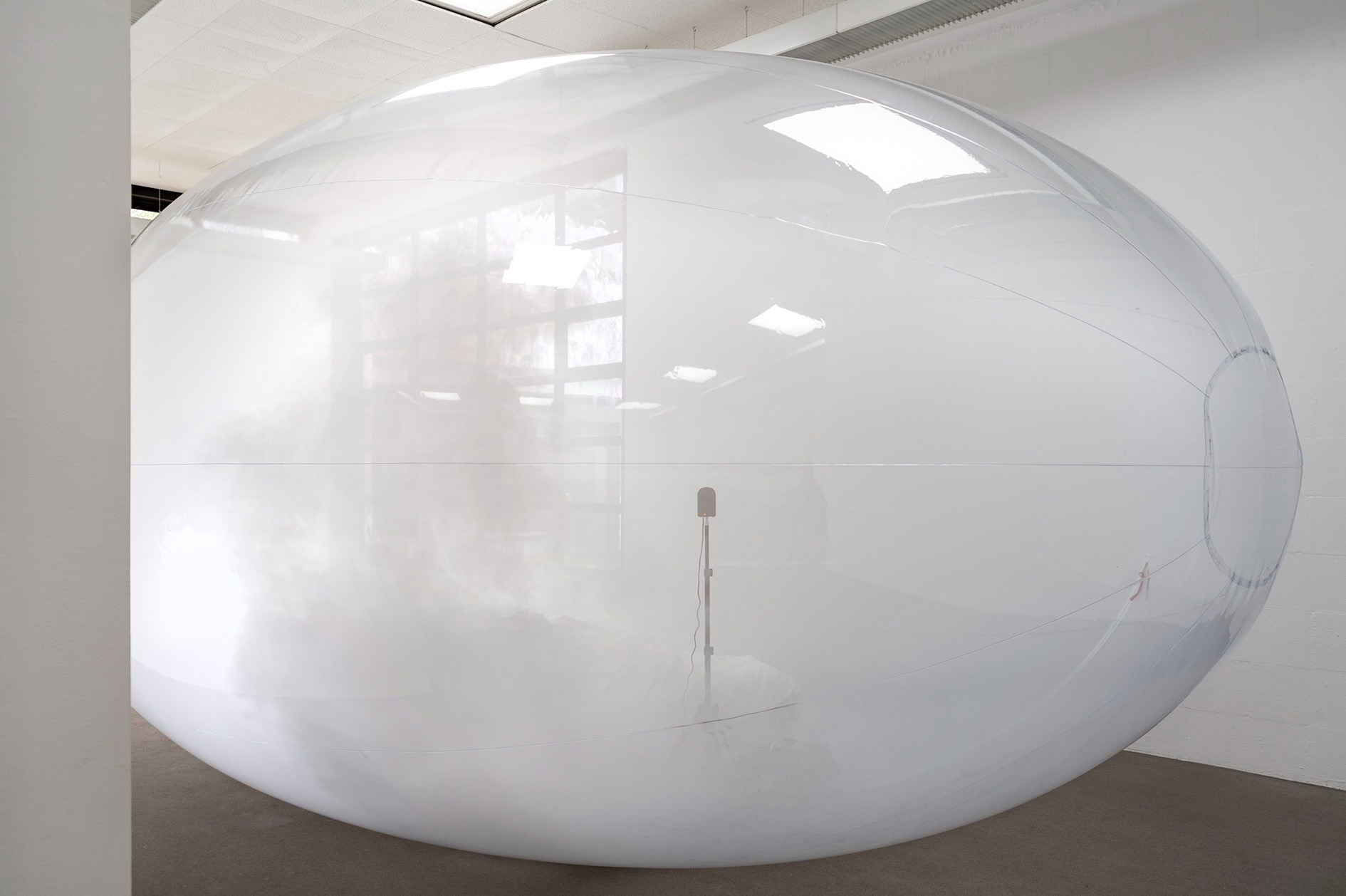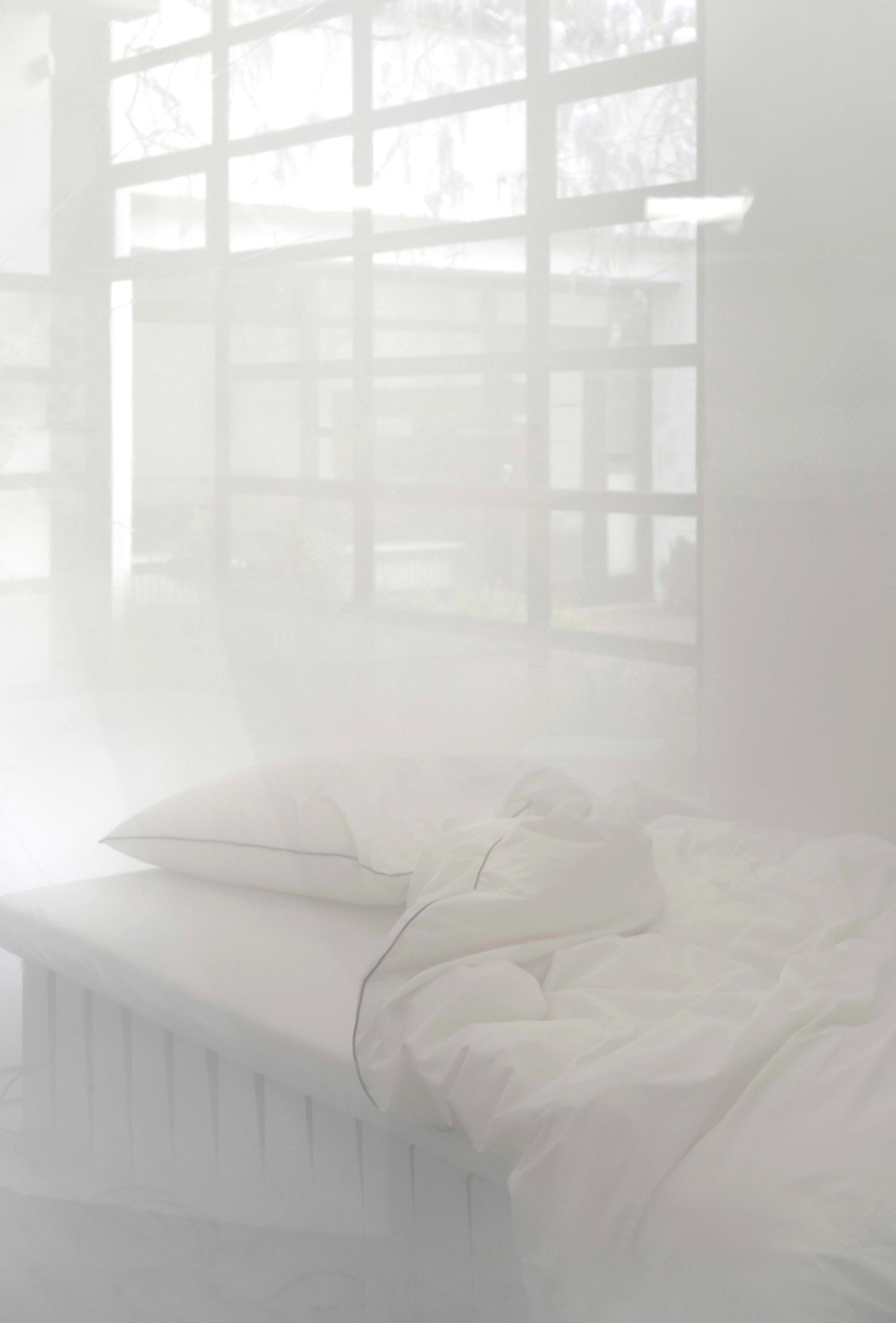The three seconds seat
By Lena von Goedeke
They slither while they pass, they slip away across the universe
— The Beatles, “Across the Universe,” 1969
I find myself in a state of profound boredom of the best kind. I linger, driving through the all-encompassing, dizzying white at 70 km/h for who knows how long. Time seems to seep through the pores between floating ice crystals, suddenly tangible as it no longer passes. Boredom is the name of a rare phenomenon: the perception of time itself, due to a lack of events. It is the most creative form of time, a terror in the polar inertia, the frenzied standstill of our world.
Words were first information, then strokes, and suddenly or gradually, melody: the only thing you need to do now is accelerate. You must not stop. Follow the taillight ahead and you'll fly home safely, says S.
Breath accumulates inside my helmet; this is the coldest day so far. Inhale, exhale, the beating of the heart. I can feel sastrugi beneath my snowmobile’s skis, the resistance. The machine time, the engine. Four-stroke.
And beneath is ice, crevassed, dwindling, and unconscious. A part of the Earth, and somewhere between track and saddle unfolds the space between planets. Space-time is void time. In my thoughts, I let off the throttle and touch the snow on the glacier’s surface with my bare hand, I adjust my inner compass. All the cells in my body turn towards the core.
I sing as I travel through the expanse at 299,792,458 m/s. Lennon's lines rain into my thoughts from nowhere, lasting as seconds stretch into infinity. Now everything stands still, nunc stans.
Possessing and caressing me
Events must be meaningful in order to transform long stretches of time into a life, into experiences. Not too many, not too few, and in between, there are passages. From time to time, they are hard to endure; we barely know their direction and can never return to the last point on the line. It disappears behind us, and in the rear mirror, there is only one view, smaller and smaller, pale, gone. Ahead, a dark area appears in the white expanse, growing until it stretches from one edge of my visual field to the other. I recognize the marbling in the ice and a narrow snow bridge spanning the meltwater channel. S. hesitates briefly. The disturbance in the smooth sequence brings a rise of fear. He accelerates, and soon even this perception fades into a memory, absorbed behind the snowmobile into the swirling white.
We try to carve steps into the transitions to avoid sliding from one event to the next in boredom. In ever smaller fragments, from notification to notification, we navigate through the day, yet meaning is slow. The open mind travels at its own speed.
The neuroscientist Ernst Pöppel determined that the point on the timeline we call present lasts three seconds. Yet only a mind that temporalizes itself creates this gap between past and future. Like a saddle on which we ride through time, the present is forever now, an eternity. My three-second seat carries me across the crevasse. The background hum of the whiteout becomes deafening with adrenaline, and I'm alive, back on track.
They call me on and on across the universe
A whiteout is a meteorological phenomenon occurring mainly in polar regions and high mountains. It describes the brightness observed when sunlight is diffused by cloud cover, fog, or snowfall onto a snow-covered surface. Due to intense diffuse reflection and very high minimum luminance, contrast diminishes drastically, making the entire field of view uniformly bright. This results in the disappearance of the horizon; ground and sky merge seamlessly. Contours or shadows are no longer recognizable, and observers feel they are in an utterly empty, infinitely expansive space. For susceptible individuals, this can cause intense psychological stress, often manifesting as anxiety and claustrophobia. Physically, whiteouts cause disorientation and impaired balance. - Wikipedia
"I experienced a gold-out," S. later recounts. "When the midnight sun in late winter reflects golden in the fine airborne snow, you almost feel like you're in the afterlife."
Today I do my best not to drive into the afterlife, following the only celestial body visible in the vast white space: the taillight.
Tumble blindly as they make their way across the universe
Only later did I learn that a thin red line on the GPS display is the thread we follow through the whiteout. But I drive blindly, following S. and S., who meander through space ahead. Without them, I would lose myself in the vastness of the universe, without the Beatles in the emptiness of time.
Cassiopeia ambles leisurely beside me through the white, trailing the next half hour, just as I do. On her shell, the second law of thermodynamics, in my head a hummed path through Broca's area. She knows nothing of the dangers of entropy, of katabatic winds, of séracs and snow. My heart echoes, words follow words. The synapses cushion every unexpected impact. My machine roars, we seem to be driving uphill, and I don't trust my eyes, I don't trust the gauges. When I run out of lyrics, I run out of fuel.
White noise creeps up on me. The rigid boots, the padded legs of the snowmobile suit, my lap are covered in a fine layer of snow. Now I am still form, not body. From where I perceive below, my figure slowly dissolves into space as I race towards the equilibrium line.
Through my open ears inciting and inviting me
The red-lit planet Yamaha changes orbit. In a wide arc, we reach the highest point of the ice cap between east and west of the island, but my hope for new weather dissolves into ice particles. I feel the disappointment in the two heads ahead of me as we travel from expanse to expanse. Within the universe of my helmet, the spaces grow larger, the distances empty. Eventually, after all songs and poems, I will disconnect this red thread from my mothership and lose myself within interstellar matter.
A transition from whiteout to void, a quantum leap. The strings vibrate in a melody that carries me through time. I can no longer sing: my breath freezes on the visor and obscures the view of myself, the instruments, the hands. Lennon would have liked that, I think, the music of the spheres. At the core of three layers of gloves, my fingers drum a soft rhythm over the sound of the Nytro. With the palm between thumb and forefinger, I keep the throttle steady. I swing with the movements of the machine on the seat, an Arctic ballet.
A passage without a next event on the horizon of a timeline is dissolution. One gets lost between neurons when the consciousness cannot mirror itself in the other, cannot calibrate with lived events, when the body's rhythm is no longer synchronised with outside. Then all songs run on repeat, winding on a loop through our brains, finding no resonance in the world. We are poorly tuned.
At the edges of my field of vision, the white noise changes. Dark particles merge into shapes, still blurry but with depth. The verticals on both sides peel pale from the fog; I recognise them. Sediment, rock, and blue ice. They make me shrink into my own dimensions. I laugh; we now have left the glacier behind and know the moraine’s lunar landscape ahead.
And calls me on and on across the universe
A gently triangular form approaches, grows larger, blue-green and glassy. From the diffuse ground rises a smooth ice wall shaped by wind and sublimation. Like the seductive surface of a display, yet cold and unyielding, the air bubbles and silt streaks within frozen into timelessness. A relic of ice, left by a dwindling glacier in a bygone decade, silently welcomes us to Earth.
We have descended from our orbit and reached the ground control point, the first landmark on my inner map. From here, I could navigate along the shale tectonics, just visible on both sides of the valley, leading northwest. To Sticky Keep, where my iPhone will briefly connect to the signal echo and register me in the monotonous here and now of the digital cosmos. There, where the signals of civilisation surround me, I feel equally pulled into the past and the future, entangled in a network of data and memories, strained to the utmost.
Here, however, in the lee of the ice, lines linger, the rhythm of the machines. S. halts, allowing the engine to idle briefly before shutting it down, and turns to me. We must soon move on before the cold reaches us in our overalls. But first, we need to pause, to look back, and ensure that our souls have kept pace.
I dismount from the three-second seat to see if my boots leave impressions in the snow. All the cells in my body turn towards the core.
Nothing's gonna change my world
Lena von Goedeke is a visual artist and essayist based in Svalbard. Her multidisciplinary work spans installations, literary essays, and film, deeply engaging themes of geological memory, ecological intimacy, and temporality. Her current project, Bis der schnee schmilzt / Until the snow melts, explores landscapes as emotional terrains of transformation, loss, and renewal.



0 Comments Add a Comment?